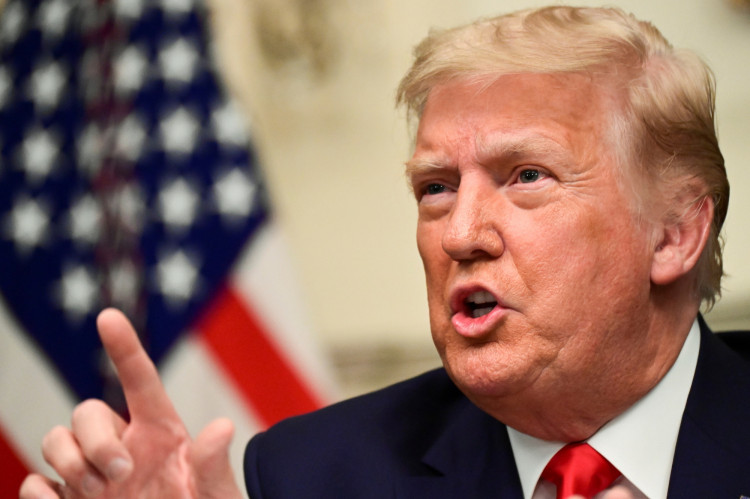President Trump moved Tuesday to enforce a fragile ceasefire between Israel and Iran after both countries accused the other of violating a truce he brokered hours earlier, threatening to unravel efforts to end the region's deadliest military escalation in decades.
On his way to the NATO summit in the Netherlands, Mr. Trump told reporters aboard Air Force One that he had personally called Israeli Prime Minister Benjamin Netanyahu to demand a halt to further strikes on Tehran. "It's enough," the president said. "And they did [call back warplanes], which I respect very much. So nobody was killed."
Moments later, the president posted on Truth Social: "ISRAEL. DO NOT DROP THOSE BOMBS. IF YOU DO IT IS A MAJOR VIOLATION. BRING YOUR PILOTS HOME, NOW!" In a follow-up, he added, "All planes will turn around and head home, while doing a friendly 'Plane Wave' to Iran. Nobody will be hurt. The Ceasefire is in effect!"
The ceasefire, announced by Trump late Monday, was designed to unfold in three phases over 36 hours. Iran was to stop its attacks at midnight Eastern, with Israel expected to pause operations 12 hours later. A formal end to hostilities was expected by midnight Wednesday.
That plan faltered almost immediately.
Shortly before the ceasefire deadline, Iranian missiles struck the southern Israeli city of Beersheba, killing four civilians and wounding 20, according to Israeli emergency services. Hours later, Israel's military claimed Iran launched additional missiles at 7:06 a.m. and again at 10:25 a.m., with no casualties reported. The Israeli Defense Forces responded by striking a radar facility near Tehran.
"In light of Iran's complete violation of the ceasefire... I have instructed the IDF... to continue the intense activity of attacking Tehran to thwart regime targets and terrorist infrastructures," Israeli Defense Minister Israel Katz said in a statement.
Iranian officials denied launching missiles after the ceasefire and accused Israel of continuing its airstrikes past the agreed-upon deadline. Foreign Minister Abbas Araghchi wrote on X: "There is NO 'agreement' on any ceasefire... However, provided that the Israeli regime stops its illegal aggression... we have no intention to continue our response afterwards."
Eyewitnesses in Tehran reported explosions Tuesday, hours after Trump said the ceasefire was in effect. Netanyahu's office said the Israeli strikes were retaliation for missile attacks that killed civilians and claimed hundreds of Iranian casualties in overnight raids on "the heart of Tehran."
Despite the chaos, officials in both countries signaled hope for de-escalation. "We're happy, very happy," said Reza Sharifi, a resident of Tehran returning from temporary relocation. "The war is over. It never should have started in the first place."
In Tel Aviv, software engineer Arik Daimant said: "Regrettably, it's a bit too late for me and my family, because our house... was totally destroyed. But... I hope this ceasefire is a new beginning."
The 12-day conflict erupted on June 13, when Israel launched surprise airstrikes on Iranian nuclear and military facilities, killing top commanders. Iran responded with missile attacks that, for the first time, pierced Israel's missile defense systems and killed at least 28 people, Israeli officials said.
According to Human Rights Activists in Iran, at least 974 people have been killed-387 civilians and 268 military personnel-in Israeli strikes. Iran has not released updated casualty figures. The organization's data comes from contacts inside Iran.
Over the weekend, the U.S. military entered the conflict, launching strikes on three Iranian nuclear-related sites. Iran retaliated by firing over a dozen missiles at the Al Udeid U.S. airbase in Qatar. Most were intercepted, and no injuries were reported. Trump later thanked Iran for providing early notice.
Drones also struck U.S.-linked bases in Iraq, including Camp Taji and Imam Ali Base, causing infrastructure damage but no reported casualties. Iraqi forces said they intercepted additional drones. No group claimed responsibility, but U.S. officials pointed to Iranian-backed proxy groups.
Qatar played a crucial mediating role, with its prime minister helping broker the ceasefire after direct conversations with Iranian officials. Trump, alongside Vice President JD Vance and Secretary of State Marco Rubio, coordinated through indirect channels. White House Middle East envoy Steve Witkoff also played a key role in facilitating communications.
Speaking to reporters, Trump emphasized he did not support regime change in Iran. "I don't want it. I'd like to see everything calm down as quickly as possible. Regime change takes chaos," he said.
International observers expressed cautious optimism. IAEA Director Rafael Grossi said, "Resuming cooperation with [the IAEA] is key to a successful agreement... this step can lead to a diplomatic solution."






